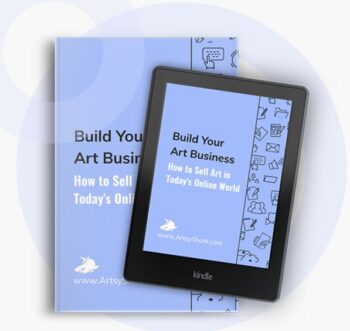By Carolyn Edlund
Are you finding it difficult to get motivated and follow through with artwork you have planned? Are you procrastinating or getting overwhelmed with the process or your inability to complete tasks?
Artsy Shark spoke recently with licensed clinical social worker and psychotherapist Max Shapey about his insights into some of the emotional issues holding artists back. Growing up in an artistic family, he has spent much of his life surrounded by creatives, and is very familiar with this subject. Although he practices hypnosis in his practice in Evanston, Illinois, he says that this technique is normally used for anxiety or breaking habits, and that talk therapy often is best to help artists find balance in their lives.
Max cites the example of a highly successful visual artist he worked with who hated every painting that he created. The artist had become well-known for his particular niche, and was pressured by his gallery into cranking out the same type of work. He resented this and wished to work in a more soulful style, but felt obligated to continue to paint as his gallery requested (which was producing income). The solution? Choosing to allot some of the artist’s time – protected time – to working on his own interests. He gave himself permission to set aside a certain portion of time for himself and his artistic growth and vision.
Sometimes artists run into the problem of not being able to finish a work, Max says. It could be a fear of having to do something further with the finished art, taking an action such as entering it into a gallery show, selling it, or moving onto another activity which might be very stressful. Emotional conflicts such as this can cause a self-fulfilled prophecy of “stuckness” or failure.
We asked Max how artists can deal with the blocks that prevent them from working. Here are some of his suggestions:
- Instead of obsessing about why you can’t get started, simply do it. Put pen to paper or brush to canvas to get yourself physically “jump-started”. There is a feedback between the object being created and the process which may help you break through the barrier.
- Don’t work with a goal in mind. Simply sketch, or work with your medium. Allow yourself to wander creatively without judgment about what you are making.
- Examine your habits in the studio. Are you working when you have sufficient time, or are you tired by the time you get started? Are other job obligations keeping you from being fresh when you get ready to start? Schedule time in your studio when you have the energy to be focused and productive.
- Give yourself permission to work in small bites until you feel emotionally ready to work at more length. If that yawning canvas is overwhelming you, bring your task at hand down to a manageable level. Work for thirty minutes or an hour, and then make a decision – do you want to continue working or take a break?
Sometimes other reasons, such as emotional issues, depression, relationship problems, identity issues and sense of self, anxiety, phase of life, or other worries and concerns get in the way of artists being able to move forward and fulfill their potential. A professional can be very helpful in working through life situations and getting yourself back on track creatively. Check www.maxshapey.com for more information about emotional issues, depression and available treatment. Take care of yourself – stay well, creative and motivated!


I almost always endure a few minutes of almost paralysing panic when all the preparatory work is done and it comes to the point of beginning the finished item! After all the fun and excitement of the planning, sketching, playing with ideas, it would be SO disappointing if the finished work didn’t turn out well. The only solution for me is to make myself just get on with it!